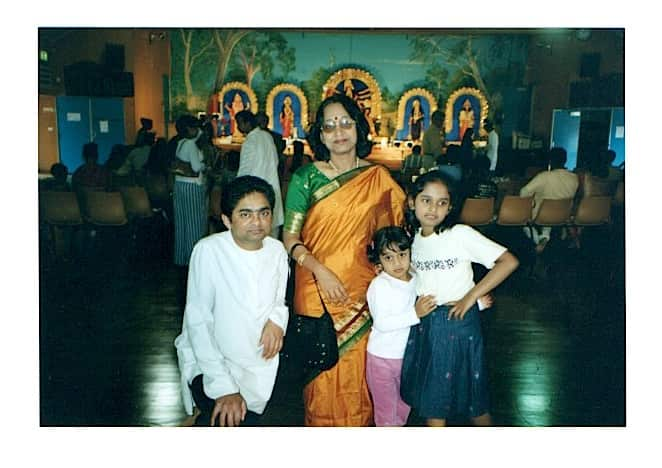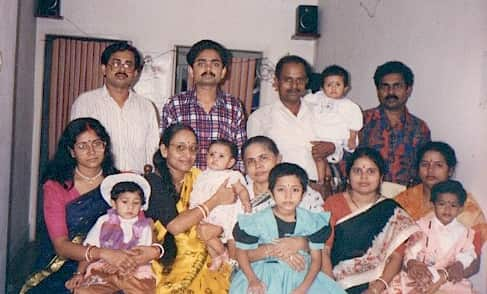Abhijit Deonath is a “small town boy’ whose identity has helped shape an imagination fit for the silver screen.
The Indian-born filmmaker from Canberra grew up in Ballarpur, in central India, to parents who never forced anything on him.
And that let him find his interests and become the person he is today.
“Music, literature, cinema – they were always my big passions, you know, right from my earliest ages,” he said.
“I’m an explorer. I like to explore things, just dive in to new areas and then start to pick up things.”
Being brought up in a predominantly Marathi and Hindi-speaking town, he believes this multicultural foundation was key to his open-minded attitude.
“We used to speak a different language at home, and once we stepped out of home, we were in the middle of people speaking different languages,” he said.
It was this community which broadened his cultural perspective, but he admits it also restricted him.
“There were pressures from society, from other peers, that I should be studying this, should be following a career along this line, but from my parents there was nothing like that,” he said.
However, he soon succumbed to these expectations and studied geology.
The move that was needed
Deonath’s passion for the arts was only a hobby and a distant dream until he moved to Australia with his family in 2000.
Like many migrants before him, his first experience of Australia was one filled with uncertainty.
“When I first landed here in Sydney airport, I knew absolutely no one in Australia,” he said. The brother of an Indian acquaintance met him but he was driven in a separate car to his wife and their then four-year-old daughter: “we drove somewhere in the night and I was very scared,” he recalls.
The brother of an Indian acquaintance met him but he was driven in a separate car to his wife and their then four-year-old daughter: “we drove somewhere in the night and I was very scared,” he recalls.

Abhijit Deonath and his family celebrate the Durga Pooja Indian Festival in Sydney in their fifth year of being in Australia. Source: Supplied
“You know, whether we’ll meet with each other again or not. We had absolutely no idea because we were with strangers.”
But these strangers soon became good family friends.
Finding a job was easy for him in an economy riding on the high waves of the Sydney Olympics.
“I used to go out early in the morning to the city and come back late,” he said.
Today he works an IT job for the public sector. But he hasn’t forgotten his love of the arts.
“Gradually, as I settled through in the middle ages, I started thinking about reviving my childhood passions and I started writing a novel based on my experiences here as a migrant,” he said.
“And slowly I started realising I might as well make a film out of it, rather than publishing a book or a novel.”
A bridge is built
Out of this came his film 'Salt Bridge'.
“It’s the story of a migrant, Indian migrant, who’s just come to Australia and he’s trying to get used to his new environment, trying to find his place among the community, Indian community, who are already settled, and the kind of issues that he faces because of strange relationships that develop around him,” he said. Here, art imitates life, as the film reflects his own experiences when he arrived – good and bad.
Here, art imitates life, as the film reflects his own experiences when he arrived – good and bad.

Abhijit Deonath (top, second from left) in 1997 with his siblings and their families in India. Source: Supplied
Since he began working on his film, his hobby has grown into serious business.
On a whim he entered it into the 88th Academy Awards and was surprised to discover seven Hindi tracks from the film had been shortlisted as a nomination in the Original Song category. He was up against the artists such as Lady Gaga, Rihanna and Sam Smith.
Although he didn’t make the final cut, he said he was still happy to represent Australia and India among other celebrities, while closing the gap between mainstream and culturally diverse media.
A never ending identity
Like his parents, he said he doesn’t force anything on his own children, rather letting them drive their own interests such as in the Indian culture.
For him, his neither bound nor limited to what he’s been exposed to.
He admits he’s not one to plan life much ahead, and does not know what he’ll be like in five or so years.
He said building his identity is an ongoing process, which doesn’t stay frozen in time.
“It’s not that you are born in a certain family, or you are born within a certain community, or born with a mother tongue and there goes your identity.”
The three-part documentary 'DNA Nation' premieres on SBS on Sunday 22 May at 8.30pm, and afterwards on SBS On Demand.











